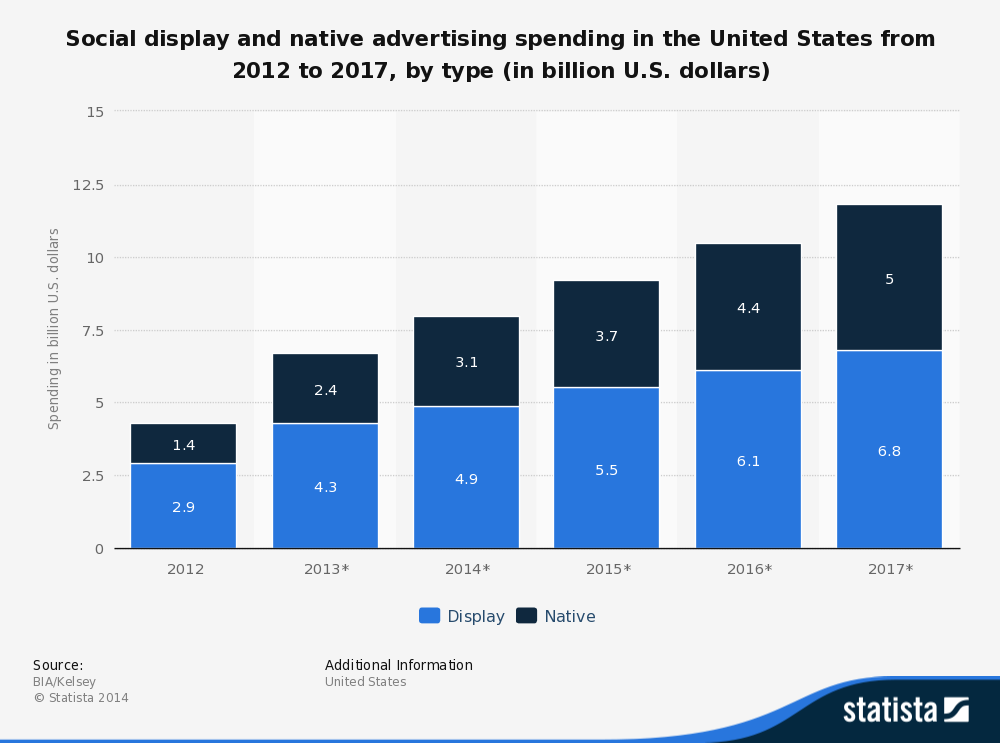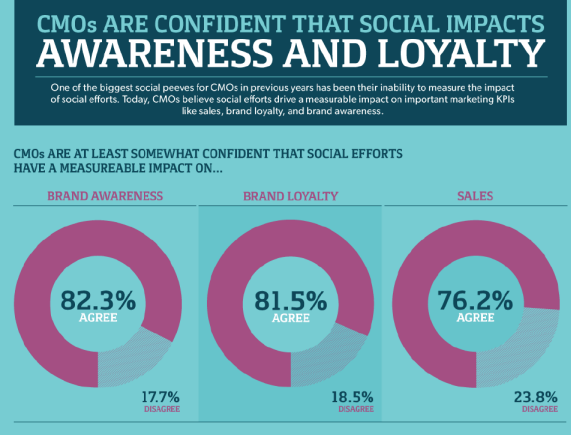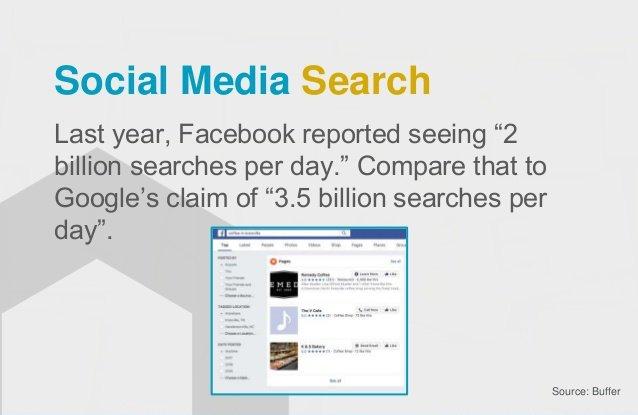The importance of social media in business is growing at warp speed. With more and more people joining social media sites and using them regularly/efficiently, the social media industry is bound to become bigger in the coming years. It’s booming like never before.
No, the social media wave isn’t ending anytime soon. And your business should take advantage of it if you want it to survive.

With such amazing growth, every business today needs to leverage proper social media channels in the best possible way. Not because it’s the “in thing”, and not because it sounds simple, but because their target audience is hanging around the popular social networks. And they’re engaging with their favorite brands and connecting with them on different levels.
By giving your business brand the social media touch, you not only generate more business but also connect with your customers better and serve them on a higher level. It actually makes your digital marketing easier.
According an infographic published by Ambassador, 71% of consumers are more likely to recommend a brand to others if they have a positive experience with it on social media.



Here are some more social media statistics that prove beyond doubt the importance of social media in business. Your business needs to leverage sites like Facebook, Twitter and LinkedIn to keep up with the competition.
- According to 2019 social media statistics, there are now 3.2 billion users around the globe. That is about 42% of our total present population.
- 68% of adults based in the U.S reportedly have a Facebook account.
- Active social media users are composed of 48.2% Baby Boomers, 77.5% Generation X and 90.4% Millennials.
- An interesting research shows that a user spends an average of 2 hours and 22 minutes in his social media account everyday including messaging.
- 73% of online marketers agree that their efforts in implementing a social media marketing strategy for their business has been effective.
- 2 million business today use Facebook advertising for promoting their products and services.
Let’s now look into the importance of social media in business by analyzing its advantages.
#1: Leverage Social Advertising
Social media advertising may be the new kid on the block, but it’s growing faster than imagined. Take Facebook Ads for example. Even though the social network launched ads in 2005, it managed to reach 9.16B in ad revenue in the first quarter in 2017. This just goes on to show that social advertising is here to stay — for a long, long time.



As more and more businesses successfully experiment with digital advertising, they’re realizing that taking the social media advertising route makes total sense. Here’s why:
- Lower ad costs: When compared to traditional advertising methods such as print media, TV and radio advertising, social ads are not only dependable, but also cheaper. What’s more, you’re allowed to engage on various social media channels for free before scaling with paid ads. You’re free to grow on your own, at your own pace.
- Targeted reach: Traditional advertising doesn’t give you the luxury to reach out to your target audience the way social media ads do. It simply doesn’t work that way. When you’re doing offline advertising, you’re taking the blind, shotgun approach where your returns are dismal even if you’re making big investments. Using social media ads you reach out to targeted prospects, increase your conversions and ultimately get a higher return on investment.
- Real-time performance analysis: Knowing if your ad is working or not is integral in order to improve it. When you’re doing any type offline advertising, you’re unable to analyze the performance of your ad campaign. Which cripples massively cripples your efforts. Social media ads on the other hand allow you to constantly keep track of how well (or how bad) your ad is performing. You’re able to change your ad on the fly and instantaneously see the results.
Last but not the least, it’s important for businesses of all types to understand that social media ads are only getting bigger and smarter. Social media advertising is where the future is headed. It’s the new wave. The question is, are you a part of it?
#2: Boost Brand Awareness
Social media proves to be a powerful tool when it comes to growing your brand awareness. There are businesses who dismiss it as a way to build a brand, but by doing that, they’re leaving an open ground for competitors. On the other hand, many reputable chief marketing officers agree that social media has a definite impact on brand awareness.



Increasing your brand awareness via social media isn’t rocket science. Here are a few tips on how you can do so.
- Find Your Audience: Before you start focusing on a particular social platform, find out whether your target audience is on it. You can do this by searching for relevant conversations about your product or industry. For example, a B2B company may find their audience on LinkedIn rather than Facebook. Don’t just assume or follow other brands.
- Use Visuals: Once you know where your target audience is, it’s time to grab their attention by using eye-catching visuals with your content. Images and videos play a big role in helping you grow your brand awareness on social media channels. Because they not only increase engagement but also boost social shares.
- Create Conversations: Social media is all about building conversations. If you use these social platforms for one-way communication, you’ll only grab so much attention. Instead, talk and listen. Get involved. Showcase your personality by conversing, tagging and mentioning others.
- Measure Your Efforts: Don’t just aim in the dark. Use the tracking tools provided by the platforms (eg: Facebook Page Insights) along with other external tools such as URL shorteners, Google Analytics, etc. to measure your social media activity. Use the insights you gain to understand what’s working so that you can optimize your efforts and build a stronger brand with social media.
- Build Authority: If you want a higher engagement rate along with better brand awareness, then work on building your authority by sharing real value. Along with borrowed content, your content you post should also have something original, as it adds to your credibility.
Remember, every single step that you take to increase brand awareness with social media will impact the overall growth of your business in the long run.
#3: Increase Inbound Traffic
Inbound marketing is one of the most effective ways to generate targeted traffic to your website. It’s the kind of traffic that actually converts because it’s super relevant. However, if you leave you ignore the importance of social media in business, you will be limited to your inner circle of customers or the people that are already familiar with your market or brand.
By putting in more effort in social media promotion, you create a whole new channel to draw in laser targeted inbound traffic and get more inbound links.



For example, having an active blog makes it easy for you to connect with your audience with the help of fresh content. But by having them share this content (on the right time) on Twitter or Facebook increases your reach 10X. You’re suddenly reaching out to a bigger audience that may like plus share your content, follow your brand and ultimately become a customer.
Similarly, people that are already actively searching for keywords related to your product or service are a smaller percentage than those who aren’t. Social media helps you connect to this larger, untapped segment of the market.
To help you understand, here’s the amount of referral traffic social media management platform Buffer generates by creating and sharing quality content on some of the biggest social media networks:



By using social media, you diversify your marketing efforts in more than one way. You don’t reach out to just one type of crowd, but connect to a versatile customer base. Which is crucial to for your brand to make a mark in your niche.
For instance, serious professionals may find your website via LinkedIn while the younger crowd or the millennials may find you on Instagram. Each piece of social media content that you create is a new door for new customers to enter. It’s a different opportunity for you to connect.
Ultimately, it boils down to creating enough high quality content that you can post on social media sites, and in the process attract high-converting inbound traffic.
#4: Improve Search Engine Optimization
Every seasoned social media marketer knows that there is some connection betweensocial media and search engine optimization. While Google has clearly stated that it does take “social signals” into consideration when ranking a page, there’s more to it.
Here’s how understanding the importance of social media in business and working on it can help improve your SEO.
- Higher Chances to be Found via Web Search – According to Matt Cutts, the former spam head of Google, social shares have no impact on your website’s ranking. But, it’s a fact that social media properties do dominate the front of the search engine result pages for brand names. Which means, social media profiles indeed have the power to rank in the top 10 results. Social media profiles are a great way to connect to your prospects and customers. They work as a doorway to your business website because they show your human side. They not only inform the searcher about your business, but also help them become a part of your conversations.



By optimizing your social profiles and by keeping them fresh with the right content, you create a stronger presence on the web. You get more exposure. And you have multiple channels to draw people towards your business.
- Ability to Reach More People Via Social Media Search – People are no longer dependent on Google search when they need to connect to something or someone. Today, search is not limited to the mighty web search engines. It has moved beyond, which is why social media platforms such as Facebook and Twitter are the new search engines.



There is massive amounts of content being created and shared on the social web. This content can easily be discovered by users with the help of keyword search, hashtags, etc. When people search for the type of content you’re publishing on your social media page, you may win new fans that want to follow, connect and do business with you. It’s just not about the content, but also about the content producer, which is you. When people see great content being created and shared, they’re curious about who’s behind it. This may lead them to look you up on LinkedIn and learn more about your business. Being a business it’s important that you take the necessary steps to stand out from other competing social media profiles and avoid have duplicate accounts.
The social media world is evolving and is so is the SEO arena. And there are high chances that social signals may start having affect on your rankings. So why not be prepared by building your social media presence with valuable content?
#5: Increase Conversion Rates
Another importance of social media in business is the fact that it is great for capturing targeted leads for your business, but it doesn’t stop there. Getting quality leads is only one part of the equation. The other part is converting those into sales.
Can social media help you increase your conversion rates? Does it have the ‘x’ factor when it comes to giving you the ground to achieve more sales?
The answer is a resounding yes, but only, if you do it the right way. Here are some ways you can use social media for better conversion rates.
- Use It for Social Proof: According to Wikipedia, “Social proof, also known as informational social influence, is a psychological phenomenon where people assume the actions of others reflect correct behavior for a given situation.” In simple terms, people do what others do. They like to believe what the majority likes to believe. The reason why social proof works is because it gives a sense of assurance to your prospects and lets them know about the benefits of your product, without any selling. Social media is brimming with activity that can be used for social proof. If someone commented on your Facebook post praising your company, use it. When someone tweets you about how your product changed their life, use it. When someone posts a happy Instagram picture of them enjoying your service, use it. Look at how KWFinder smartly embeds tweets from their customers on their site as social proof:



- Use it for User-Generated Content Creating quality content for social media is crucial. But what better way to create this content than have your loyal fans do it for you. People that follow you on social media may mention you in a positive note, which you can use to feature them on your social profile. The UGC acts like a social proof that indirectly helps you increase conversions. Also, this doesn’t need to happen by chance. In fact, you can engineer it by asking people to share specific content for a chance to get featured to a wide audience. Given that you have a decent audience size, most social media users would be thrilled to have such an opportunity. You need to get creative in your approach and ask people. When Belkin did the launch for their Lego iPhone cases, they tapped into the power of their social community. They asked customers to personalize their cases in their own unique way and share the pictures on Instagram.



- As you can see, a ton of customers were excited enough to share their personalized cases with the right hashtags. This helped Belkin gain targeted exposure and higher conversions at zero cost.
There are many ways that social media can impact conversions and help you increase sales. But for that, you need first to understand the importance of social media in business and take the necessary steps. We at LYFE Marketing are committed to helping you do just that. Check out our pricing page to see how we can work together to help you get better conversions.
#6: Satisfy Your Customers
Losing a customer is hard, and gaining a new one is harder. But retaining an existing customer is 10 times easier. Which is why customer satisfaction should be your topmost priority.
By using social media to connect with your customers, you have the opportunity monitor what they want, the problems they’re facing and how you could serve them.
In order to truly satisfy your customers and make their life easier, you need to offer them customer service that is more personalized and effective. And social media helps you do just that.
Customers these days know that social media is a lot more approachable and friendly than a call center executive, thousands of miles away, who has a hard time resolving your problem. In other words, customers want superior service without the hassle.
Increasing customer satisfaction with social media includes:
- Monitoring conversations to see if your customers are talking about your brand and in what context.
- Broadcasting important messages, announcements and offers to customers via a social media platform such as Twitter.
- Offering prompt customer service to customers who are facing genuine problems or need some help with the product or service.



- Holding regular question & answer sessions with customers to understand their concerns, get real feedback and see how things can be improved.
- Connect and build a relationship with power users or customer advocates so that they can help serve other customers.
Regardless of what social media platform you’re using to help your customers, it’s important to speak their language, give them personalized service and respond to them without much delay.
#7: Enhance Brand Loyalty
A lot of businesses are stuck on their follower count, which is nothing but a vanity number. It doesn’t serve a real purpose if the followers aren’t loyal to your brand. There’s a difference between a random follower and loyal one, because the latter adds real value.
If you want to get the most out of your social media marketing efforts, it’s crucial that you focus on increasing brand loyalty. Having a loyal following means better engagement and better conversations.
Ask any loyal social media follower about their trusted brand, and they will speak positive about it without the need to push. Which leads to natural word of mouth marketing.
You can enhance brand loyalty on social media by:
- Having a Solid Social Media Strategy – Social media platforms are evolving, and each has its own personality. Facebook is not Twitter, and Twitter is definitely not LinkedIn. Which means, you can’t take the same old, outdated marketing and advertising methods and apply them to social media. You need to formulate a social media strategy that clearly aligns your goals with other areas such as content marketing, search engine optimization, etc. This should give you a fair idea of what type of value you can create for your loyal social media followers. It’ll allow you to not only retain them but also help them spread the word.
- Sharing Value-Oriented Content – There’s a reason why your followers are loyal to you. They’re looking for value, which you will have to deliver at all times by sharing quality content. For example, sharing a detailed case study is much better than a 500 word article. The more useful and relevant the content you post, the better. Plan how and what type of content you would like to share with your following. By spending time on strategizing your content creation, your content will fetch you a higher ROI when you share it. So don’t rush. See what sets your content apart from others. For example, visual content gets more shares than regular social media content. Which means you’re free to use photos, videos, etc. as long as they add some value.
- Being Consistent – Your brand has a personality, and certain aspects that are unique to it. By identifying these personality traits and by bringing them out, it gets easier to connect to your target audience. Your aim should be to be consistent in your approach and maintain the same voice throughout your interactions. The content that you create/share along with how you converse with others should reflect your brand’s personality.
- Responding to Queries – You may not be a celebrity for your social media followers, but they do look up to you for answers. So when they approach you with a relevant query, you should get back to them with the right answers. This way they will know that you are the real deal. And that your business actually cares about others. But don’t limit your answering adventures to your loyal followers. Go out there and hunt for questions that have partial answers or no answers. You can search using targeted keywords and look for questions that need a response. By answering these questions, you establish yourself as an expert or an authority.
- Show the Human Side – While it’s okay to automate your social media posting with a tool like Buffer, it’s not-so-okay to keep doing it. Personally interacting with other people and humanizing your brand will go a long way. It will keep your followers/fans keeping coming back for more.
A lot of businesses try to present themselves as big corporations, which is a mistake. People need people, not auto bots. Which is why you need to connect to them on a more personal level and engage in real conversations. Even if it’s just for the sake of interacting.
Conclusion
The importance of social media in business can only be understood once you start applying what we discussed.
If done right, in the long run, social media marketing can prove to be really cost effective. Because as of today, even the paid social media campaigns, such asFacebook Ads, are cheaper than other advertising options such as search engine ads. Which means there’s a higher return on investment.
Jumping on the social media bandwagon is no longer a matter of choice if you want to succeed. Your business needs it. Every business needs it. The importance of social media in business is now more prominent than ever.


